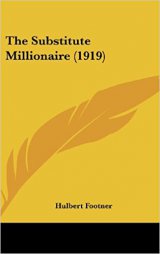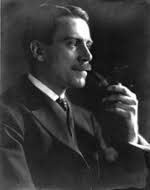The Substitute Millionaire Page #7
Jack Norman had no idea he was Silas Gyde's sole heir—until the multimillionaire was killed by an anarchist's bomb and Jack found himself the richest man in New York. The inheritance included a warning from his benefactor about an elaborate protection scheme promising to protect the wealthy from anarchists, in which Gyde had declined to enroll. Recognizing his own danger, Jack enlists a out-of-work actor to take on his own identity, while he, in the guise of Jack Norman's secretary, works furiously behind the scenes to break up the gang and unmask their leader, the mysterious Mr. B.
"Complete?" thought Jack with knitted brows. "What is complete? What am I to enter alone?" Then a light broke upon him. "The Vault of course! This is the combination!" He lost no time in returning to the Madagascar. It may be remarked here, that when Jack afterwards told Mr. Delamare about these visits the banker laughed heartily. "Isn't that like old Gyde! Renfrew, Nathan Harris and Gair, bitter enemies! He wasn't going to take any chances of their getting together!" It was about five o'clock when Jack entered Silas Gyde's rooms the second time. He double-locked the door leading to the hotel corridor, and set to work on the combination with a burglarious feeling, which all his assurances to himself that it was his own property could not quite dissipate. Jack had had no experience with such elaborate locks as this, but after all the principle was the same as that of Fisher's safe where he had been accustomed to keeping his books at night. After a number of false starts and misses, the steel bolts finally rang back, and the great door swung noiselessly outward. Alas for Jack's expectations! The vault inside was as bare as Mother Hubbard's cupboard. There was not so much as a scrap of paper to be seen, let alone the dazzling stores he had pictured. The wall down each side were lined with shelves on which lay a thick, undisturbed coating of dust. Apparently there never had been anything kept there; at least not for a long time. Jack was thoroughly disgusted. All that chasing around town for nothing! Was his benefactor's only purpose in taking those elaborate precautions to make a fool of his heir? Perhaps the old man had been really insane. But having taken all that trouble Jack did not mean to give up until he had made very sure there was nothing to be gained from it. He examined the vault anew, and presently made a curious discovery in the steel door. Differing from any safe he had ever seen, the handle which operated the bolt ran right through to the inside of the door, also the dial and knob of the combination were reproduced inside. "What did he want that for?" thought Jack, with perplexed brow. "Almost looks as if he wanted to lock himself up inside." It was dark within the vault, and Jack lit the oil lamp and carried it in. He had not paid much attention to the back of the vault, for his eye had told him it was flush with the outer wall of the building, but he was now struck by the fact that whereas the sides of the vault were of concrete the back wall was of steel, and there were no shelves covering it. In short, the lamp revealed the outline of a door in the back wall, a steel door so beautifully fitted that only the tiniest of lines marked its boundaries. In it was a tiny slit that Jack's fourth and last key exactly fitted. When it was pressed home, the door swung towards him on a spring. Here he received another surprise. Instead of the shallow wall cupboard he expected, for he knew he was against the outer wall of the hotel, the beams of the lamp illuminated a large cupboard heaped with rubbish in the corners. At the same moment he was greatly startled to hear an electric bell start ringing somewhere further within. He realized of course that he had stumbled on a secret way into the house adjoining the hotel. He remembered the aspect of that house from the street, shuttered, neglected, dirty. What would the inside reveal? The feeble, fretful alarm of the electric bell perturbed him. He closed the steel door and it stopped: he let it swing open and the sound recommenced. For whom was it a warning? Inside the closet on his right there was an ordinary wooden door. It did not help to compose his nerves to hear a soft urgent whining and scratching on the other side of it. The lamp trembled a little in his hand. However there was nothing for it but to advance. Jack was boy enough to refuse to take a dare. He had been instructed to enter alone, and he was not sufficiently frightened to disobey. There was a kind of fascination in entering upon this voyage of discovery alone. Moreover he had no reason to suppose that a trap had been prepared for him. Before venturing in, he took a careful survey of the closet. The litter in the corners consisted of old clothes, old boots, newspapers. A musty smell arose from it. His attention was caught by a broad black belt painted on the floor at his feet. Stooping, he touched it, and the black came off on his finger. "Soot," he thought. He took care to step over it when he entered. The scratching still continued on the other side of the inner door, but Jack was reassured by the sound of an anxious little bark. "That's not a very formidable animal," he thought, smiling, and opening the door. His first impression was of a little black and tan terrier, who waited just inside the door with an expression of anxiety, human in its intensity. At the sight of Jack the dog snarled and attempted to retreat, but weakness overcame it and it fell. "Poor beastie!" murmured Jack. The little animal, whether reassured by Jack's voice or prompted by his own great need, attempted to make friends. He approached wagging a feeble tail. He dragged himself towards the fireplace, and with piteous, speaking glances, directed Jack's attention to a tin box upon the mantel. A human voice could scarcely have been plainer. "Is that where they keep it, old man?" said Jack. In the box were some crusts. He made haste to toss them to the little dog, and filled his dish with water. Jack found himself in a good-sized room to which no ray of daylight penetrated. His sense of direction told him it must be the second floor rear of the dwelling house. There was no lack of character here. The place was both sordid and piteous, and very eloquent of Silas Gyde's strange life. "This was his real home," thought Jack, looking around. "The hotel apartment was simply a blind.... Poor old fellow!" 5 Jack as an instinctive precaution returned to close the vault door, and the inner steel door. The latter was provided with a handle on the closet side to draw it to. When Jack closed it the irritating little bell stopped ringing. "That was to warn him if any one opened it while he was inside," thought Jack. "And the band of soot on the floor was to inform him if his stronghold had been entered during his absence. What a queer old boy to take so much trouble to hide himself!" Silas Gyde's room in its architectural features was exactly like thousands of second floor backs in the endless rows of houses built from forty to fifty years ago. As Jack stood inside the closet door by which he had entered, two windows faced him, looking out on the back yards he knew, though they were closely curtained. At his right was a fireplace with a composition mantel, at his left was the door leading to the stair hall. The bed was below the hall door: it is always there. And adjoining the room on that side would be the bath room. Jack had lived in many such houses.
Translation
Translate and read this book in other languages:
Select another language:
- - Select -
- 简体中文 (Chinese - Simplified)
- 繁體中文 (Chinese - Traditional)
- Español (Spanish)
- Esperanto (Esperanto)
- 日本語 (Japanese)
- Português (Portuguese)
- Deutsch (German)
- العربية (Arabic)
- Français (French)
- Русский (Russian)
- ಕನ್ನಡ (Kannada)
- 한국어 (Korean)
- עברית (Hebrew)
- Gaeilge (Irish)
- Українська (Ukrainian)
- اردو (Urdu)
- Magyar (Hungarian)
- मानक हिन्दी (Hindi)
- Indonesia (Indonesian)
- Italiano (Italian)
- தமிழ் (Tamil)
- Türkçe (Turkish)
- తెలుగు (Telugu)
- ภาษาไทย (Thai)
- Tiếng Việt (Vietnamese)
- Čeština (Czech)
- Polski (Polish)
- Bahasa Indonesia (Indonesian)
- Românește (Romanian)
- Nederlands (Dutch)
- Ελληνικά (Greek)
- Latinum (Latin)
- Svenska (Swedish)
- Dansk (Danish)
- Suomi (Finnish)
- فارسی (Persian)
- ייִדיש (Yiddish)
- հայերեն (Armenian)
- Norsk (Norwegian)
- English (English)
Citation
Use the citation below to add this book to your bibliography:
Style:MLAChicagoAPA
"The Substitute Millionaire Books." Literature.com. STANDS4 LLC, 2025. Web. 21 Jan. 2025. <https://www.literature.com/book/the_substitute_millionaire_40>.




Discuss this The Substitute Millionaire book with the community:
Report Comment
We're doing our best to make sure our content is useful, accurate and safe.
If by any chance you spot an inappropriate comment while navigating through our website please use this form to let us know, and we'll take care of it shortly.
Attachment
You need to be logged in to favorite.
Log In